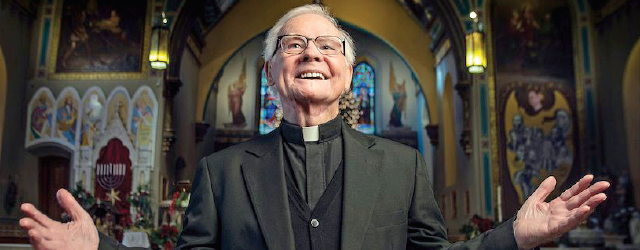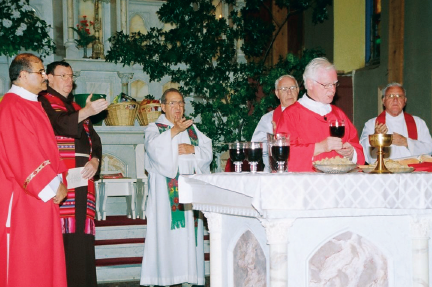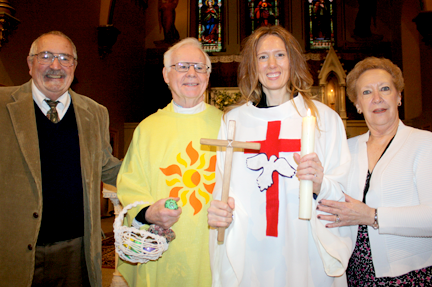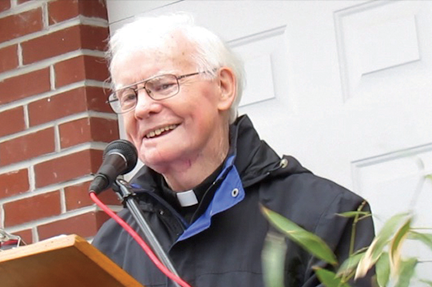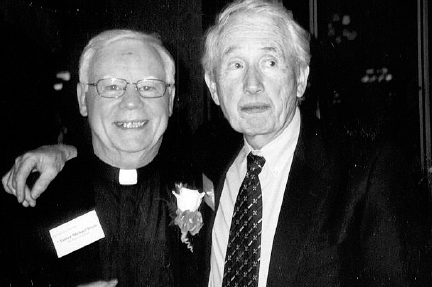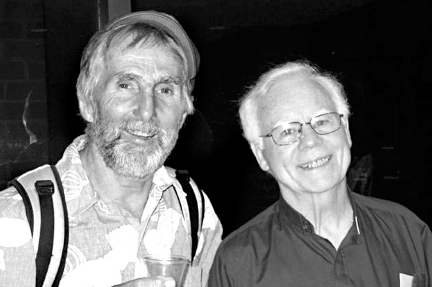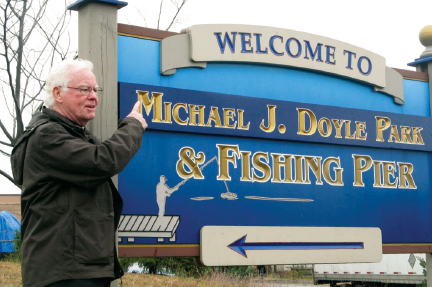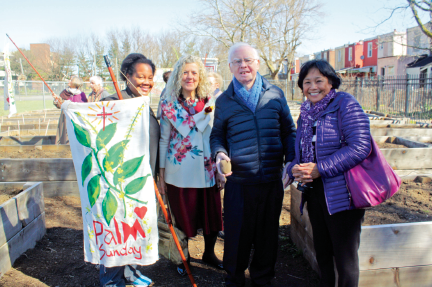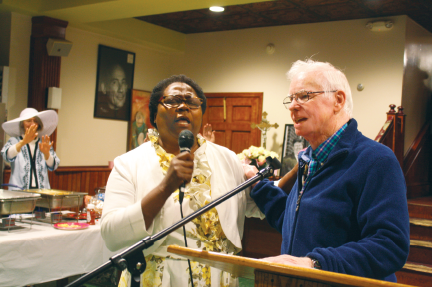By Thom Nickels
It’s not that long a ride from New Jersey’s PATCO line to Camden’s Sacred Heart Catholic Church. Camden, the forgotten city, the city of Walt Whitman, Campbell’s Soup and RCA Victor, a city that by all accounts should be resurrected but which, decade by decade, seems to stay the same.
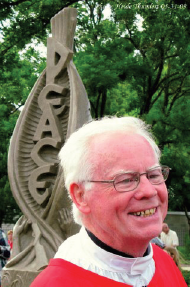
I’m here to chat with Msgr. Michael J. Doyle, the priest with the Irish brogue who has been pastor of Sacred Heart for over forty years. Fr. Doyle was an activist antiwar priest during the Vietnam War era. He was also one of the Camden 28 arrested for destroying Draft Board records at a Camden draft board office in 1972.
Fr. Doyle’s political activism came on the heels of multiple mass protests against the Vietnam War, including the 1965 self immolation of Catholic Worker member Roger Allen La Porte, who doused himself with gasoline in front of the United Nations building. “I did this as a religious action,” La Porte said while dying, “I’m against wars, all wars…”
Fr. Doyle’s study, called ‘The Miracle Room,’ is filled with memorabilia, framed documents, icons and photographs. On one desk there’s a framed photo of Fr. Doyle with Harry Reasoner of Sixty Minutes. On another wall there’s Mother Teresa during her visit to Sacred Heart in 1976, and below that are several framed photos of the Berrigan brothers.
Two large framed photos of Walt Whitman bring the legacy and importance of Camden into focus. The largest and best photo of Whitman, considerably yellowed after almost 150 years, contains the poet’s signature. The photo and signature were both done just a few months before Whitman’s death.
The rectory secretary, Teresa, chauffeured me from the PATCO Collingswood station. We drove to Sacred Heart, passing St. Bartholomew Catholic Church, with its large outdoor wooden cross and Black Lives Matter sign replacing the traditional INRI inscription. A sign of the times, perhaps; we live in a queer age.
Msgr. Doyle retired as pastor of Sacred Heart on July 15, after spending over 40 years at the parish. At 85 years old, he’s been in Camden since 1974. He is easily recognizable with his neatly combed white hair cresting in a very small pompadour. He has one of those contagious charismatic smiles that some people like to talk about.
Msgr. Doyle says he is grateful to God because he survived cancer of the jaw. People with cancer of the jaw often have half their jaw removed and live the remainder of their life wearing a surgical mask (this has nothing to do with covid-19). His cancer was discovered during a routine dental examination when his dentist noticed a growth. This led to two operations, one of them 12 hours long. He credits two doctors at Fox Chase Cancer Center for saving his life but mostly he credits the Holy Spirit.
Teresa serves us coffee and cold drinks. I am one of many journalists who have visited the famed priest since the announcement of his retirement. There have been articles in the Courier-Post and in The Philadelphia Inquirer.
When one sits down with Msgr. Doyle the conversation can go anywhere. About his retirement he says that he won’t really be leaving the parish but will maintain an office in the rectory and will be living in a house that he bought across the street.
Msgr. Doyle’s background is well known. His grandfather, Patrick Doyle (1874-1959), was a man of great faith and a farmer in Ireland who spent his days ploughing fields with his horses. He would work through rainstorms and then come home soaking wet, take off his cap and set it on a hook by the fireplace and say “It’s a terrible day…thanks be to God.” Patrick Doyle, who died at 84, had memorized the entire old Latin Mass and could recite it from memory.
He taught young Michael the Latin responses and how to serve Mass. Both Michael Doyle and his brother, John James became priests. John James served in the Camden Diocese for a while but returned to Ireland where he died of lung cancer.
Msgr. Doyle co-opted his grandfather’s “It’s a terrible day…thanks be to God,” as the title of a 2003 collection of his monthly letters to friends and parishioners. He began writing the letters in 1984 not for publication “but as lifelines to many people, without whom, Sacred Heart Church’s many ministries in Camden would not survive.” The letters are a ministry. “To me they are music, sad and glad, of some of the things that happen and have happened around Sacred Heart in Camden,” Msgr. Doyle said.
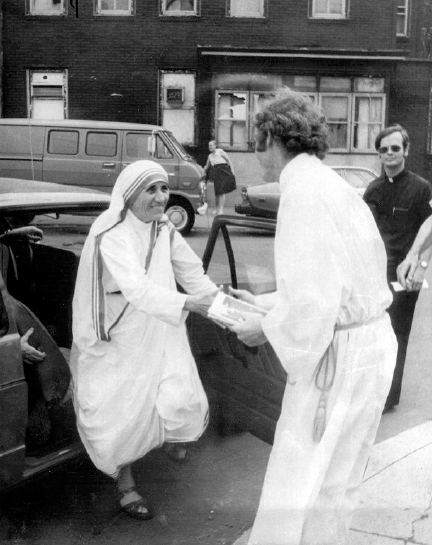
Doyle was sent to Camden in 1968 when he was a 33-year-old priest. Camden was supposed to be some sort of punishment for his outspoken opposition to the Vietnam War. His opposition to the war also got him removed as a religion teacher at Holy Spirit High School near Atlantic City.
In 1971, Doyle joined with 27 men, many of them priests, and women to destroy draft records at the Federal Building in Camden. The purpose was to destroy records for A-1 men, or the most eligible to be drafted.
An informer in their group had alerted the FBI. Then President Nixon was hopeful that the trial and prosecution of the Camden 28 would end the anti-war movement. The three-and-a-half month trial with its 9,000-page transcript did not work out well for the President, since in May of 1973, 17 of the 28 were found not guilty.
The New York Times reported that: They [the defendants] also asked the jury chosen from throughout southern New Jersey, to ignore the laws against breaking and entering and to acquit them as a means of saying that the country had had enough of the “illegal and immoral” war in Vietnam.
One of the jurors Mrs. Anna Bertino of Hammonton, said later that both points had influenced the jury. She said the jury felt the Government had gone too far in setting up the crime and wanted to join the defendants in taking stand against the war.
Doyle told me that he had nothing prepared for his closing arguments prior to the jury’s deliberation. He says he struggled to write something but found that he couldn’t write a word. In the end, he decided to allow the Holy Spirit to inspire him.
“Sixteen per cent of the priests in the Diocese supported me then and The Philadelphia Inquirer was very good to me,” Doyle said, adding that at one point the newspaper sent him to Northern Ireland during the worst of the troubles there. Doyle says he knew both Bobby Sands, who died from a hunger strike in 1981, and activist Bernadette Devlin. “I loved Bernadette Devlin,” he says.
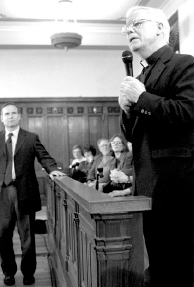
He mentioned Mother Teresa’s visit to Scared Heart in 1976. He got Mother Teresa to visit Sacred Heart when he attended an address that Mother Teresa gave to women religious. He says that after her talk he went up to her and invited her to come to Camden and meet the poor women that she had been talking about in her address. Mother Teresa said she would visit during the 1976 Eucharistic Congress. Fr. Doyle says he kept the visit a secret from the press because he didn’t want a media circus but word got out anyway.
Another side of Msgr. Doyle emerged during my visit to Sacred Heart. That was when we touched on liturgical matters like the Mass and the importance of ritual. I told him that I frequent a Russian Orthodox parish in Philadelphia’s Northern Liberties neighborhood. Msgr. Doyle seemed quite interested in this and informed me that years ago a Greek Orthodox friend of his, with a wonderful sense of ritual, often spoke to him on how to use and develop ritual in his parish. “Words cannot compare with ritual,” Fr. Doyle said. “When you try to put words on a par with ritual then priests are reduced to readers. Ritual is good for the soul. People don’t know they need ritual.”
The use of ritual (in the Mass) is not the use of words. “We are sick of words,” Msgr. Doyle emphasizes. “Words are all around us. Words are on TV, the radio, everywhere…we are assaulted by words.”
He described what has become a tradition at Sacred Heart, namely the First Sunday of Advent when the priest blesses expectant mothers. “The expectant mothers stand with lighted candles around the altar. It’s a beautiful and moving ceremony, especially when I (the priest) says, ‘We bless you and the child within you, in the name of the Father, Son and the Holy Spirit.’ Yes, it’s ritual that nourishes us,” Msgr. Doyle emphasizes again.
“Protestants — Baptists and others — are so dependent on words. The unlimited gift of life is ritual that nourishes us, and the best attitude of the human heart is gratitude. To be thankful is the best way to be on the planet.”
Many conversations with Doyle inevitably touch on family life. His mother was one of 13 children, he says. She also had 100 hens that she would allow to feed in the various fields around their Ireland home. His mother sold the hens’ eggs to get flour and sugar for the home. “She baked two loaves of bread every day. We had tea at 4 p.m. and dinner at 1 p.m.,” he says, as if in a time machine trance.
His sister, Anna May Doyle, was a Mercy nun and a Registered Nurse named Sister Conception. Anna May died at age 35 when she was hit by a car in a rainstorm on Dublin Road. Anna May and Michael Doyle were very close as children and young adults.
The emotion on Msgr. Doyle’s face is evident as he tells me the story.
“On the day that she died an unbelievable sadness came over me. It was a pain that was breaking out over my chest. I didn’t know why I was so sad. It was overwhelming and I couldn’t shake it. Then I got a call about one and a half hours later. The call came from Ireland. It was my brother-in-law and he said that he had sad news. He said, “Anna May — then his voice broke — “is in a Dublin hospital. She was hit on Dublin Road.”
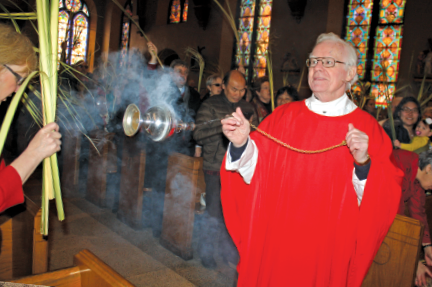
He adds that the driver had only one windshield wiper working while driving during an intense rainstorm. “He didn’t see her because half of the windshield was blinded by tears. She was a delightful human being and a great loss to us.”
I asked Msgr. Doyle to give me his thoughts on present day Ireland. “Ireland is sad,” he said. “It’s not a nurturing country any more. It is affected by marketing and TV…it’s all a question of marketing to get more things. The Irish in Ireland are too full of themselves to go to church. Ireland has gone pagan.”
Perhaps Msgr. Doyle was thinking of Joseph Ratzinger’s (Benedict XVI), 1958 lecture titled The New Pagans and the Church, which stated that the Church “is no longer, as she once was, a Church composed of pagans who have become Christians, but a Church of pagans, who still call themselves Christians, but actually have become pagans.”
Father Vincent Guest
The Sacred Heart parish house is a busy place. During my talk with Msgr. Doyle, Teresa announced the arrival of two visitors. The first was the new pastor of Sacred Heart, Fr. Vincent Guest, a 1977 graduate of Father Judge High School, who decided to drop by and say hello. Fr. Guest is a personable sort, as conversational as his predecessor. Seated in Fr. Doyle’s chair in ‘The Miracle Room,’ Sacred Heart’s new priest gave me a rundown on his history, beginning with the story of his mid-life priesthood.
At age 17, he says he enrolled in Saint Charles Borromeo Seminary but, being so young, left “on good terms” to go to Temple Law School for a career in politics. He then worked with Governor Casey in Harrisburg and specialized in immigration law for the disadvantaged when he became director of the law center at the Holy Name of Camden Ministries. In his fifties he says that the calling he felt as a teenager to become a priest returned as “the calling of the Holy Spirit.”
“I was put on a theological fast track for two and a half years at the Catholic University of America,” he says. Guest was ordained in 2012. “Eight years a priest,” he says, “and I’ve never been happier. You walk with people in all stages of life, from the joy of Baptism, weddings, tragedy and death…”
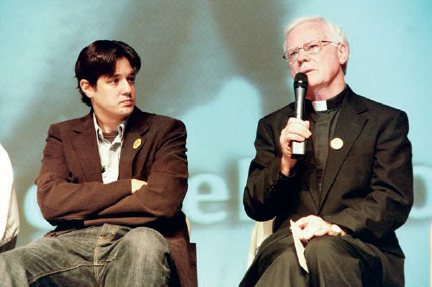
“The Camden 28” when the film was shown in Camden. He is with Anthony Giacchino, the film’s producer/director of photography.
We chatted about the big shoes he had to fill. As he told The Courier-Post, “I feel a little like the guy who replaced Babe Ruth in the outfield for the Yankees.” I told Fr. Guest that he would cast his own special shadows, make his own imprint, just as the popes do. Many thought that John Paul II would be a hard act to follow, but then came Benedict XVI and then Pope Francis, never mind that every pope has his fair share of fans and detractors.
The second visitor who came knocking was Dr. Douglas Clayton, the Director and Executive Producer of a new 30-minute documentary on Msg. Doyle, Heart of Camden.
The film documents Doyle’s early life in Ireland as well as his four-decade struggle to revitalize the City of Camden, especially his founding of the nonprofit, Heart of Camden housing in 1984.
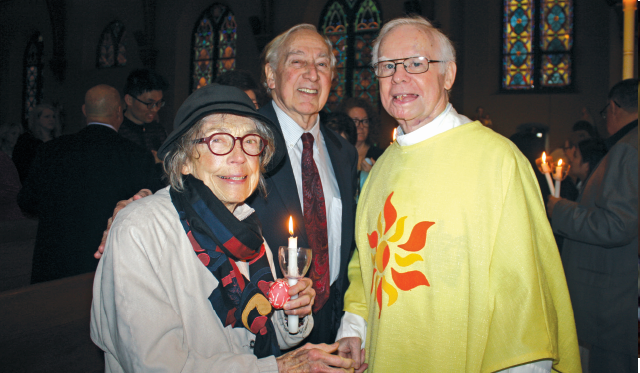
The documentary was to premier in February 2020 but Covid-19 caused it to be postponed. The premier is now slated for September at the South Camden Theatre Company, barring unexpected developments.
The film is narrated by actor Martin Sheen, a friend of Doyle’s who when asked to be a part of the project, said, “Absolutely beautiful! It’s an honor to be a part of this film.”
Funding was provided by Mark and Ann Baiada, founders of Bayada Health Care.

